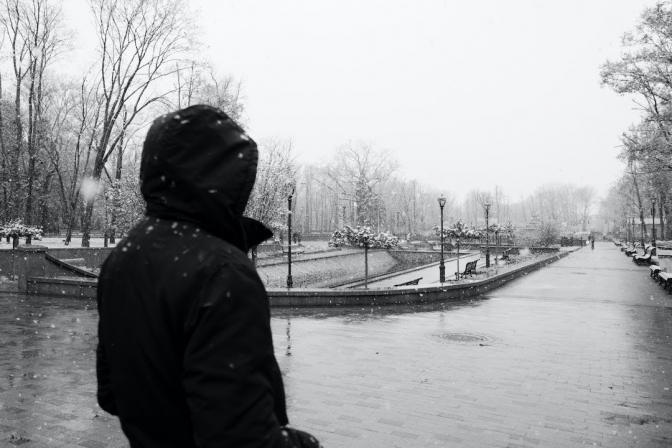
Kharkiv, Ukraine | Photo by Blake Dunn on Unsplash
By Joe Lindsley with Kateryna Bortniak, and Vitalii Holich
Kharkiv, Ukraine – United Kingdom Prime Minister Boris Johnson said in Kyiv Tuesday that the threat from Russia against Ukraine is «perhaps the biggest demonstration of hostility to Ukraine in our lifetimes.» But many Ukrainians remember the situation in 2014 as much more dire than today. Here in this city 36 km (20 miles) from the Russian border, during the wild days after Ukraine’s Revolution of Dignity, Russians briefly occupied the city hall and raised their flag atop it. The fall of the city seemed possible.
«The situation [then] was even more dire,» Konstantyn Chyzhyk, a former government official post-Revolution and a mentee of reformers including American-born finance minister Natalie Yaresko, told me in the Real Ukraine podcast.
Although in 2014 the Ukrainian people had successfully ousted the pro-Russian regime, they still faced serious problems in the subsequent months.
«Most of our intelligence services, the army, security service, all those institutions in 2014 were infiltrated by Russian agents. We didn’t even have that much control of our law enforcement and army at that time,» said Konstantyn, who was head of office of Ukraine’s President’s Investment Council under Petro Poroschenko, the prior president, and briefly under President Zelenskiy.
But Russian-speaking Ukrainians in the central and eastern cities, assisted by volunteers from the west, «stood their ground with zero resources against one of the strongest armies on the planet.»
Here’s what happened in Kharkiv:
It was April 2014, less than two months since the Revolution of Dignity, when after months of citizens camping in Kyiv’s main square, amid secret police violence, Ukraine’s then-pro-Moscow regime fled to Russia.
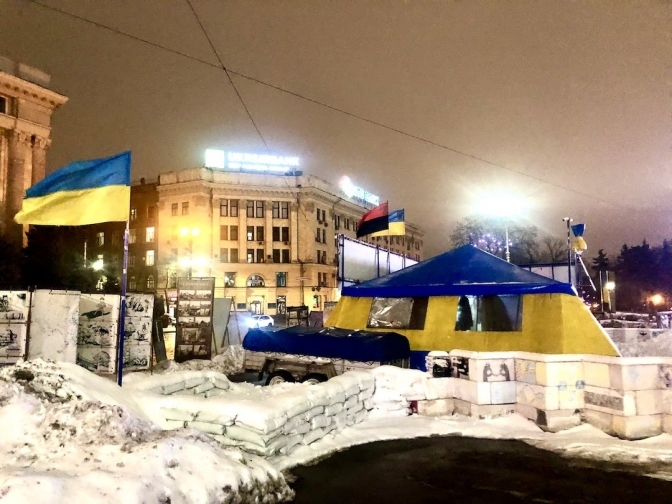
To this day, volunteers man and maintain the bunker-tent that has been in Kharkiv’s main square since 2014. The square is lined by posh restaurants and hotels. The red-black flag is sort of Ukraine’s «battle-flag,» akin to the American «Don’t Tread on Me» banner
Ukraine had a new president, Petro Poroshenko, Ukrainian-speaking and patriotic. But he was a chocolate baron, not a military strategist. According to Viktor Bavykin, a Kharkiv businessman, civic leader, and former soldier, Poroschenko and his new government were caught unaware when Russia achieved its annexation of Crimea 18 March and began to stir anti-Ukraine unrest in Donbas, a Ukrainian region southwest of Kharkiv and bordering Russia.
Some said the Donbas fighters were «separatists,» other acknowledge they were supported by Russia, and others, such as American Ukraine analyst Andrew Fink, who lived six years in Kyiv, say those fighters were actually «Russian irregulars»: They knew how to drive tanks, they were well equipped with weapons and ammunition.
It seemed cities like Odesa, Ukraine’s major Black Sea port, and Kharkiv, its second city, with 1.4 million people, were Moscow’s next targets for these «Russian irregulars.»
Indeed, Kharkiv’s million-plus people already had many Russian connections.
«There were many common marriages [between Ukrainians and Russians,» says Ihor Balaka, a Kharkiv civic leader, real estate businessman, and an interviewer in the city’s press club. «Most of the cars you could see at that time were on the Russian registration. People from Russian cities came here, because we had the big market «Barabashova,» and other establishments, which supplied Crimea, Donbas, and Russian people with goods.»
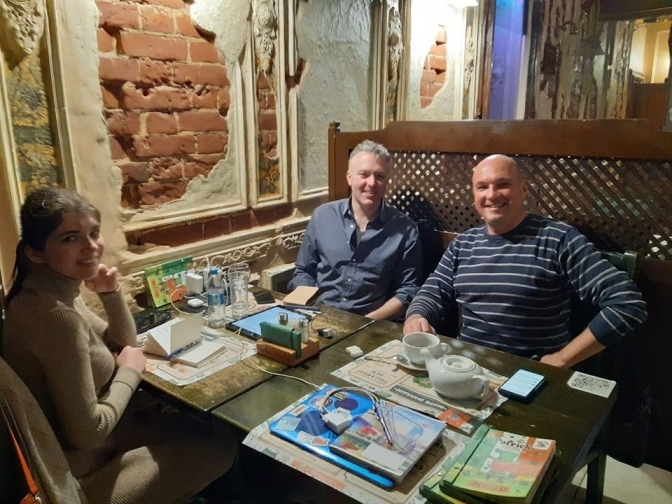
Ihor Balaka, speaking with some of the Lviv Now team, January 2022, Kharkiv
«At that time [2014], it was totally possible to occupy Kharkiv,» says Ihor, who is deputy head of the Kharkiv Office of the European Business Association. «I still remember that there was no defence infrastructure near the city, nothing functioned among the military vehicles in warehouses, there were no weapons.»
And so Moscow seemed to make its move.
As Ihor tells it, in April buses from the nearby Russian cities of Belgorod and Kursk brought loads of Russians to Kharkiv, where they stayed in camper vans.
«It all was made to create the impression of the ‘Russian world’ here,» says Ihor.
Some of these bussed-in people, intent taking over the oblast administration building, accidentally went to the «Theatre named after Taras Shevchenko» thinking it was city hall.
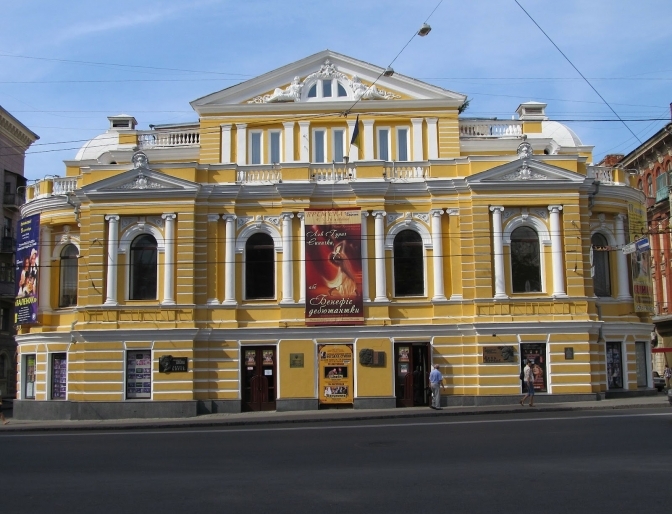
The Drama Theatre named after Taras Shevchenko, Kharkiv
«They came to the watchmen and started to demand a meeting with the mayor,» Ihor says. «The theatre workers repeatedly said that it was a theatre, and there is no mayor there, but the demonstrators didn’t believe it and warned that they would conquer the building.»
Those days were chaotic and bizarre, Ihor says. «Even the journalists of the Russian non-state TV-channel ‘Dozhd’ came here and asked what was happening.»
There were significant conflicts near the stadiums where fans of the football club Metalist, whose stadium I can see as I type these words from my hotel, «fought the people who came to kill those with a pro-Ukrainian position, so the city showed resistance,» Ihor says.
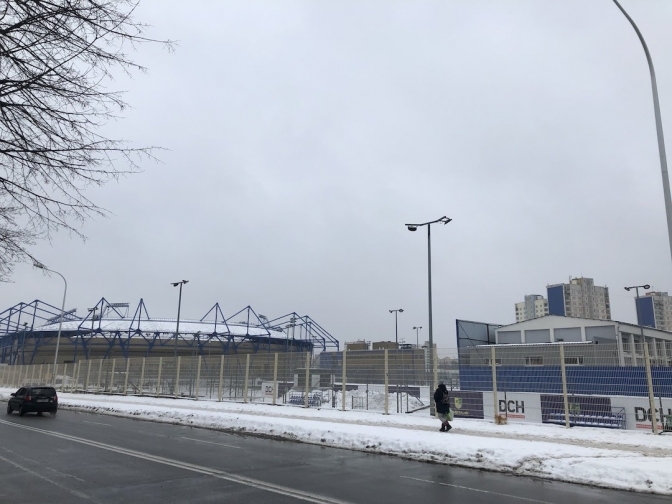
The Metalist Stadium, 2022
Eventually, some of these Russians tried to storm the main government building. Some made it inside, where the mayor was.
That mayor, Gennady Kernes, had first been on the pro-Russian side, but his friends and local businessmen had persuaded him to join the Ukrainian side, Ihor says.
«Most important,» he adds, was the intervention at that time of Arsen Avakov, an Armenian Azerbaijan-born Kharkiv citizen and politician who, post-Revolution, became Ukraine’s Minister of Internal Affairs.
«He brought a special force unit ‘Jaguar’ from Vinnytsia,» in west-central Ukraine, «and they freed the building of Kharkiv State Administration, arresting 77 or 78 rebels,» Ihor says. «Unlike in the other regions, the necessary rigidity was demonstrated [in Kharkiv].»
«One thing irritated me,» Ihor adds, «that someone caused the leak of information that the operation was prepared for the evening. So, the organisers of the riot managed to escape, leaving only some marginal elements in the building of a Regional Administration.»
From 14 April, Kharkiv was solidly Ukrainian again, but threats and attacks continued sporadically even in 2015. On 28 April, a gunman shot Mayor Gennady in the back; he remained in a wheelchair and he remained mayor until his death at 61 in 2020.
Today, Kharkiv, unlike the city of Donetsk, 313 km / 200 miles away, and which fell into Russian hands, is a thriving hub of education, industry, outsourcing, tech, and–perhaps crucially–military equipment-factories, such as the tank-making Kharkiv Morozov Machine Building Design Bureau.Donetsk, as this January BBC story illustrates, is suffering.
Ihor calls it a «commercial, multicultural, tolerant» city.
What was Moscow doing? What was Putin up to?
«I don’t think that Putin was after territory,» Andrew Fink, an American friend now in Tallinn, Estonia, but who lived in Kyiv six years, told me in the Real Ukraine podcast. He earned his PhD from the Dutch University of Leiden studying Russian use of conspiracy theories in propaganda. «[Putin] was after federalizing Ukraine, which would mean the end of the Revolution.»
«I think we need to realize how much Putin and Putin’s people might be driven by fear, not of NATO, not of the EU, of a free Ukraine,» Fink said. «I tend to believe that is his ultimate target. It’s not some new European security structure. … If Ukrainians manage to flourish … and they are on course to do so [post-Revolution],» Fink says, «Russians are gonna say, ‘if those people can do it, why can’t we do it?’»
Putin’s threats are felt here, even without an invasion:
«Let me repeat,» Ihor says, «This situation has a very negative impact on the investment attractiveness of Ukraine.»
Konstantyn Chyzhyk, on the other hand, believes that Putin’s build-up of troops along the Ukrainian border is designed to fray the nerves of the West, so that he can have leverage to achieve what he wants, including a pledge that Ukraine will never be part of NATO.
Ukrainians are used to this game, Kostya says, but Putin’s tactics still seem to shock the West.
Whatever Putin’s motives, everyone with whom I speak, from Lviv in the West, just 70 miles from Poland and the European Union, to Kharkiv in the east, just 20 miles from Russia believe that the Ukraine of 2022 is stronger than the Ukraine of 2014–and the latter, despite the odds, still stopped Russia from further invasion.
«The people are in much better mental shape and much better suited to fight back whatever aggressive or provocative actions Putin will throw at us.» Konstantyn Chyzhyk said in the Real Ukraine podcast.
«I’m not worried about Russia,» another friend, a business-owner, in Lviv told me recently. «Because if they do come here, we will just have to fight them, and we will fight them, and we will win, because we have nowhere else to go. This is our country.»
«If [the events of 2014] would happen [again] in Kharkiv, I can say that every other building would be a fortress,» Ihor Balaka says.
By Joe Lindsley with Kateryna Bortniak and Vitalii Holich
Follow Lviv Now on Facebook and Instagram. To receive our weekly email digest of stories, please follow us on Substack.
Lviv Now is an English-language website for Lviv, Ukraine’s «tech-friendly cultural hub.» It is produced by Tvoe Misto («Your City») media-hub, which also hosts regular problem-solving public forums to benefit the city and its people.











